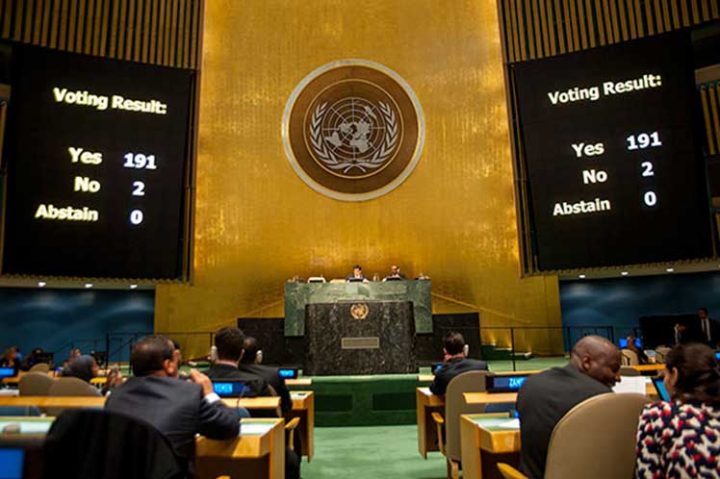By Laura Becquer Paseiro*
Havana (Prensa Latina) This year, the United States adopted again a stance that was believed to be a thing of the past: it voted at the United Nations against Cuba”s resolution condemning the economic, commercial and financial blockade that Washington has imposed on the Caribbean island since 1962.
Washington’s stance took no one by surprise, above all after the current administration of President Donald Trump said that it would step up that unilateral and coercive policy against Cuba.
Although the process of normalization of relations between the two countries resulted in Washington’s abstention for the first time in history in 2016 at the United Nations, during the Barack Obama administration (2009-2017), this time, the United States decided to implement a policy that has been described as ‘obsolete’ by U.S. authorities themselves.
Twelve months ago, the change in the vote was historic, because it was Washington’s recognition that its strategy to isolate Cuba had only isolated the U.S. for more than half a century.
Days before the voting at the United Nations on November 1, 2017, U.S. Department of State Spokeswoman Heather Nuert pointed out that the change underlined ‘the new approach on Cuba’ being defended by Republican President Donald Trump, who took office on January 20, this year.
The said approach took apart some achievements made during the Obama administration and was ratified by Trump in Miami, Florida, on June 16.
That stance was reinforced by a media show on alleged acoustic incidents against U.S. diplomats in Havana.
The radical turn in relations with Cuba was reflected at the United Nations, where Cuba has presented a resolution demanding an end to the U.S. blockade since 1992.
For the twenty-sixth time in a row, Cuba got an overwhelming diplomatic victory, as 191 of 193 UN member States voted in favor of its resolution.
The result was the same as in the previous two years: Cuba is supported in its demand to have the economic blockade lifted, while the United States is increasingly isolated.
DAMAGE BY THE BLOCKADE
The blockade violates the UN Charter, it is a violation of the principles of non-intervention in the nations’ internal affairs and the freedom of international trade, as politicians from all over the world have denounced.
In his speech before the UN General Assembly, Cuban Foreign Minister Bruno Rodriguez said that this policy is in force more than ever, above all due to the Trump administration’s determination to intensify it.
The head of Cuban diplomacy charged that this policy is a flagrant, mass and systematic violation of Cubans’ human rights and an act of genocide, as it aims to suffocate the people economically.
Rodriguez underlined that the blockade is also the biggest obstacle to Cuba’s economic and social development and to the implementation of the National Plan, in tune with the UN 2030 Agenda for Sustainable Development.
He assured that estimates by Cuban institutions show that the blockade’s economic damage from April 2016 to June 2017 amounted to 4.305 billion dollars.
However, since its implementation in 1962, the total damage by the blockade has amounted to 130.178 billion dollars at current prices.
Taking into consideration the depreciation of the dollar against gold on the international market, the losses by the blockade total 822.280 billion dollars, according to the resolution submitted by Cuba to the United Nations.
In the resolution, entitled Necessity to End the Economic, Commercial and Financial Blockade Imposed by the United States of America on Cuba, the Ministry of Economy and Planning estimates that the country’s needs 2-2.5 billion dollars in direct foreign investments to achieve its economic development.
*A journalist at Prensa Latina’s National Desk.






